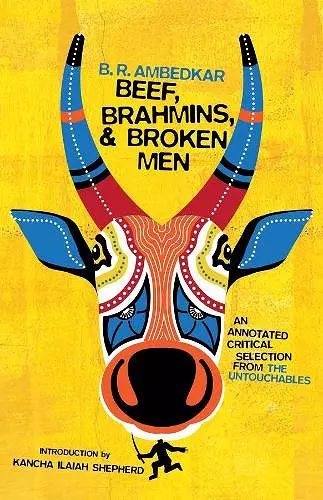Beef, Brahmins, and Broken Men
An Annotated Critical Selection from The Untouchables
B R Ambedkar author Kancha Ilaiah editor
Format:Hardback
Publisher:Columbia University Press
Published:27th Mar '20
Currently unavailable, and unfortunately no date known when it will be back

One of twentieth-century India’s great polymaths, statesmen, and militant philosophers of equality, B. R. Ambedkar spent his life battling Untouchability and instigating the end of the caste system. In his 1948 book The Untouchables, he sought to trace the origin of the Dalit caste. Beef, Brahmins, and Broken Men is an annotated selection from this work, just as relevant now, when the oppression of and discrimination against Dalits remains pervasive.
Ambedkar offers a deductive, and at times a speculative, history to propose a genealogy of Untouchability. He contends that modern-day Dalits are descendants of those Buddhists who were fenced out of caste society and rendered Untouchable by a resurgent Brahminism since the fourth century BCE. The Brahmins, whose Vedic cult originally involved the sacrifice of cows, adapted Buddhist ahimsa and vegetarianism to stigmatize outcaste Buddhists who were consumers of beef. The outcastes were soon relegated to the lowliest of occupations and prohibited from participation in civic life. To unearth this lost history, Ambedkar undertakes a forensic examination of a wide range of Brahminic literature. Heavily annotated with an emphasis on putting Ambedkar and recent scholarship into conversation, Beef, Brahmins, and Broken Men assumes urgency as India witnesses unprecedented violence against Dalits and Muslims in the name of cow protection.
Beef, Brahmins, and Broken Men is that rare achievement, a work that combines meticulous historical scholarship (taking account of books like D. N. Jha’s The Myth of the Holy Cow, but sharply challenging many of their conclusions) with a passionate, persuasive call to action. It argues how the onus is now on non-Dalits to take a historical view of the consumption of beef and express solidarity with Dalits and other beef eaters in India today. The editors’ selections from B. R. Ambedkar’s 1948 work The Untouchables, along with the painstaking annotations, show to us the pressing relevance of this work to contemporary India. The brilliant introduction by Kancha Ilaiah Shepherd reveals, among many eye-opening points, how Ambedkar already understood the forces that led to incidents like the suicide of Rohith Vermula in 2016. The essay by Alex George and S. Anand on Ambedkar’s theory of “The Broken Men” persuasively supports his ideas about the origins of the Untouchable caste. This is an important book that will give valuable ammunition to the forces that oppose the most glaring abuses of human rights in India today. -- Wendy Doniger, author of The Hindus: An Alternative History
B. R. Ambedkar rewrote the history of untouchability as the practice of social outcasting and historical violence that followed the defeat of Buddhism in ancient India, and by so doing he prioritized the social suffering and ongoing stigmatization of the Dalits, the Broken Men. This extensively annotated critical selection is a potent reminder of the audaciousness of Ambedkar's method and the insurrectionary power of his writings for our political present. -- Anupama Rao, author of The Caste Question: Dalits and Politics in Modern India
Among the numerous sins of the Hindutva forces, the beef ban, which includes not only slaughtering of cattle but also possession of its meat, is the most calamitous. It is not the question of Muslims and Dalits alone, who are directly affected; it affects India’s very future. This selection from Babasaheb Ambedkar’s 1948 work, with a focus on beef eating and its implications, exposes the duplicity and falsehood of the civilizational argument on which the entire Hindutva superstructure stands. -- Anand Teltumbde, author of The Persistence of Caste: The Khairlanji Murders and India’s Hidden Apartheid
A huge intellectual endeavor. A labor of love! The editors’ essay on Broken Men Theory makes for a powerful and compelling argument (through Meillassoux) about Ambedkar’s fundamental critique of the sacredness of historical discourses as such, about Ambedkar’s speculative material method and his academically ‘untouchable’ hypothesis on the emergence of untouchability, about the absolutely contingent eruption of untouchability, the sheer unreason/madness of the untouchability as against the universalizable principle/truth of equality and every occurrence in history is equal and comparable to any other across time and space. -- Vaibhav Abnave, Prabuddha Collective
I marvel at the sheer labor put into Beef, Brahmins, and Broken Men. There are two kinds of annotations here: one that places Ambedkar's remarks in context, pointing to where he departs from the source material, how he works with it, the slippages in his argument, and so on. And the other, which adds and expands on information in his text. -- V. Geetha, historian
Ambedkar makes a moving and completely original argument in this work to try and understand how untouchability came to be and what it became. This is enriched by the depth of the scholarship involved in setting up the critical notes. -- Uma Chakravarti, historian
I applaud the spirit of this project. It unlocks a new contemporaneity that signifies a particular relationship of desire to read Ambedkar’s original text in a new, writerly way. The urgency of the annotations is derived from questions, problems and passions that belong to our times. -- Soumyabrata Choudhury, scholar
ISBN: 9780231195843
Dimensions: unknown
Weight: unknown
424 pages